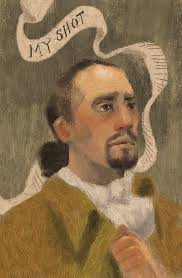
alexander hamilton wiki : Alexander Hamilton (January 11, 1755 or 1757 – July 12, 1804) was an American statesman and one of the Founding Fathers of the United States. He was an influential interpreter and promoter of the U.S. Constitution, as well as the founder of the nation's financial system, the Federalist Party, the United States Coast Guard, and the New York Post newspaper. As the first Secretary of the Treasury, Hamilton was the main author of the economic policies of George Washington's administration. He took the lead in the Federal government's funding of the states' debts, as well as establishing a national bank, a system of tariffs, and friendly trade relations with Britain. His vision included a strong central government led by a vigorous executive branch, a strong commercial economy, a national bank and support for manufacturing, and a strong military. Thomas Jefferson was his leading opponent, arguing for agrarianism and smaller government.
Hamilton was born out of wedlock in Charlestown, Nevis. He was orphaned as a child and taken in by a prosperous merchant. When he reached his teens, he was sent to New York to pursue his education. He took an early role in the militia as the American Revolutionary War began. In 1777, he became a senior aide to General Washington in running the new Continental Army. After the war, he was elected as a representative from New York to the Congress of the Confederation. He resigned to practice law and founded the Bank of New York.
Hamilton was a leader in seeking to replace the weak national government, and he led the Annapolis Convention (1786) which spurred Congress to call a Constitutional Convention in Philadelphia. He helped ratify the Constitution by writing 51 of the 85 installments of The Federalist Papers, which are still used as one of the most important references for Constitutional interpretation.
Hamilton led the Treasury Department as a trusted member of President Washington's first Cabinet. He was a nationalist who emphasized strong central government and successfully argued that the implied powers of the Constitution provided the legal authority to fund the national debt, assume states' debts, and create the government-backed Bank of the United States. These programs were funded primarily by a tariff on imports, and later also by a controversial whiskey tax. He mobilized a nationwide network of friends of the government, especially bankers and businessmen, which became the Federalist Party. A major issue in the emergence of the American two-party system was the Jay Treaty, largely designed by Hamilton in 1794. It established friendly trade relations with Britain, to the chagrin of France and supporters of the French Revolution. Hamilton played a central role in the Federalist party, which dominated national and state politics until it lost the election of 1800 to Jefferson's Democratic-Republican Party.
In 1795, he returned to the practice of law in New York. He called for mobilization against the French First Republic in 1798–99 under President John Adams, and became Commanding General of the previously disbanded U.S. Army, which he reconstituted, modernized, and readied for war. The army did not see combat in the Quasi-War, and Hamilton was outraged by Adams' diplomatic success in resolving the crisis with France. His opposition to Adams' re-election helped cause the Federalist party defeat in 1800. Jefferson and Aaron Burr tied for the presidency in the electoral college in 1801, and Hamilton helped to defeat Burr, whom he found unprincipled, and to elect Jefferson despite philosophical differences.
Hamilton continued his legal and business activities in New York City, and was active in ending the legality of the international slave trade. Vice President Burr ran for governor of New York State in 1804, and Hamilton campaigned against him as unworthy. Taking offense, Burr challenged him to a duel in which Burr shot and mortally wounded Hamilton. He died the next day on July 12, 1804.
Following Is The Brief Wiki And Biography Of Alexander Hamilton :
September 11, 1789 – January 31, 1795
President George Washington
---------------------------------------------------
Preceded by Position established
---------------------------------------------------
Succeeded by Oliver Wolcott Jr.
---------------------------------------------------
Senior Officer of the United States Army
In office
December 14, 1799 – June 15, 1800
---------------------------------------------------
President John Adams
---------------------------------------------------
Preceded by George Washington
Succeeded by James Wilkinson
Delegate to the
Congress of the Confederation
from New York
In office
November 3, 1788 – March 2, 1789
Preceded by Egbert Bensonor
Succeeded by Seat abolished
In office
November 4, 1782 – June 21, 1783
Preceded by Seat established
Succeeded by Seat abolished
---------------------------------------------------
Born January 11, 1755 or 1757
Charlestown, Nevis, British Leeward Islands
---------------------------------------------------
Died July 12, 1804 (aged 47 or 49)
New York City, New York
Resting place Trinity Church Cemetery
Political party Federalist
Spouse(s) Elizabeth Schuyler (m. 1780)
Children Philip Hamilton
Angelica Hamilton
Alexander Hamilton Jr.
James Alexander Hamilton
John Church Hamilton
William S. Hamilton
Eliza Hamilton Holly
Philip Hamilton (the second)
Parents James A. Hamilton
Rachel Faucette
Education King's College (renamed Columbia)
Signature
Military service
Allegiance New York
United States (1777–1800)
---------------------------------------------------
Service/branch New York Provincial Company of Artillery
---------------------------------------------------
Continental Army
Seal of the United States Board of War and Ordnance.png United States Army
Years of service 1775–1776 (Militia)
1776–1781
1798–1800
---------------------------------------------------
Rank Union Army major general rank insignia.svg Major general
---------------------------------------------------
Commands U.S. Army Senior Officer
---------------------------------------------------
Battles/wars American Revolutionary War
• Battle of Harlem Heights
• Battle of White Plains
• Battle of Trenton
• Battle of Princeton
• Battle of Brandywine
• Battle of Germantown
• Battle of Monmouth
• Siege of Yorktown
Quasi-War






0 comments: